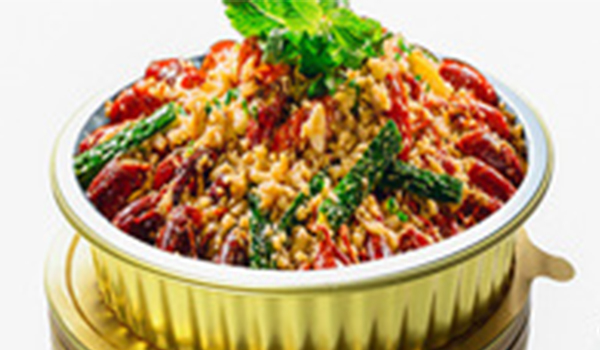What are the advantages of aluminum foil lunch boxes and containers?
1. Non-toxic raw materials, quality and safety
Aluminum foil is made of primary aluminum alloy and rolled through multiple processes. It does not contain heavy metals and other harmful substances. In the production process of aluminum foil, high-temperature annealing and disinfection process is adopted. Therefore, aluminum foil can be safely in contact with food and will not contain or promote bacterial growth. In most cases, aluminum foil will not react with food. However, a considerable number of plastic lunch boxes on the market are produced with raw materials of unknown origin or even fake materials and waste plastics, and the quality reliability is difficult to guarantee. If calcium carbonate, talcum powder, industrial paraffin, and recycled waste are added to the production raw materials of disposable plastic tableware, it is easy to cause the evaporation residue (n-hexane) of the product to exceed the standard. In July 2013, the General Administration of Quality Supervision, Inspection and Quarantine, the State Administration for Industry and Commerce, and the State Food and Drug Administration issued a special "Notice on Effectively Strengthening the Supervision and Management of Disposable Foam Plastic Tableware". In order to protect the environment and prevent the harm of plasticizers to society and the human body, some local governments have also formulated regulations to restrict the use of disposable non-degradable plastic tableware.
2. Convenient heating, no harmful substances are produced after heating
Aluminum foil has high conductivity, which can minimize the time and energy associated with food processing, refrigeration and secondary heating. Aluminum foil has good thermal stability. During processing and packaging, aluminum foil containers can withstand temperature changes well. Under high and low temperatures of -20℃-250℃, the molecular structure is stable and unchanged. Its use temperature can range from rapid freezing to extreme baking and grilling. During this period, the aluminum foil will not deform, crack, melt or burn, and will not produce harmful substances. Using aluminum foil to separate high-temperature charcoal fire and smoke can avoid carcinogens caused by scorching food. Aluminum foil lunch boxes and containers are very suitable for high-temperature sterilization and heat sealing. Aluminum foil lunch box containers can be heated in a variety of ways, including heating food wrapped in aluminum foil in various ovens, ovens, oxygen-free heating cabinets, steamers, steamers, microwave ovens (must be used in light waves and grills), and pressure cookers. Relevant companies have developed matching aluminum foil lunch box secondary heating equipment and packaging equipment, which can greatly improve the distribution efficiency of catering companies and ensure the quality of meals. In contrast, plastic lunch boxes and containers have significantly lower high temperature resistance than aluminum foil products. They will release harmful substances when in contact with hot food, water or after being heated at high temperature, which will affect human health. (Foamed lunch boxes are made of polystyrene raw materials. The softening point of polystyrene raw materials is between 87℃ and 97℃. Therefore, they cannot be used in a temperature environment above 80℃.)
3. Easy to form, convenient for sealing and coating, and ensure food hygiene
Aluminum foil has good formability. During the process of punching tableware, even in the wrinkled and curled parts, no cracks or breaks will occur. Aluminum foil of different shapes, thicknesses, alloys and heat treatment states can be selected as needed to accurately reflect the purpose of the product. Aluminum foil lunch boxes and containers can use lids made of the same aluminum foil material, or lids made of paper or other materials. It can be easily deformed and wrinkled to achieve good sealing, strong heat preservation and freshness preservation capabilities, and can avoid spillage or contamination during food storage and transportation, significantly reducing food waste. For large-scale food delivery companies and central kitchen distribution, the automatic sealing equipment developed by aluminum foil lunch box manufacturers can be used to improve delivery efficiency, and the effect is significantly better than lunch boxes made of other materials.
